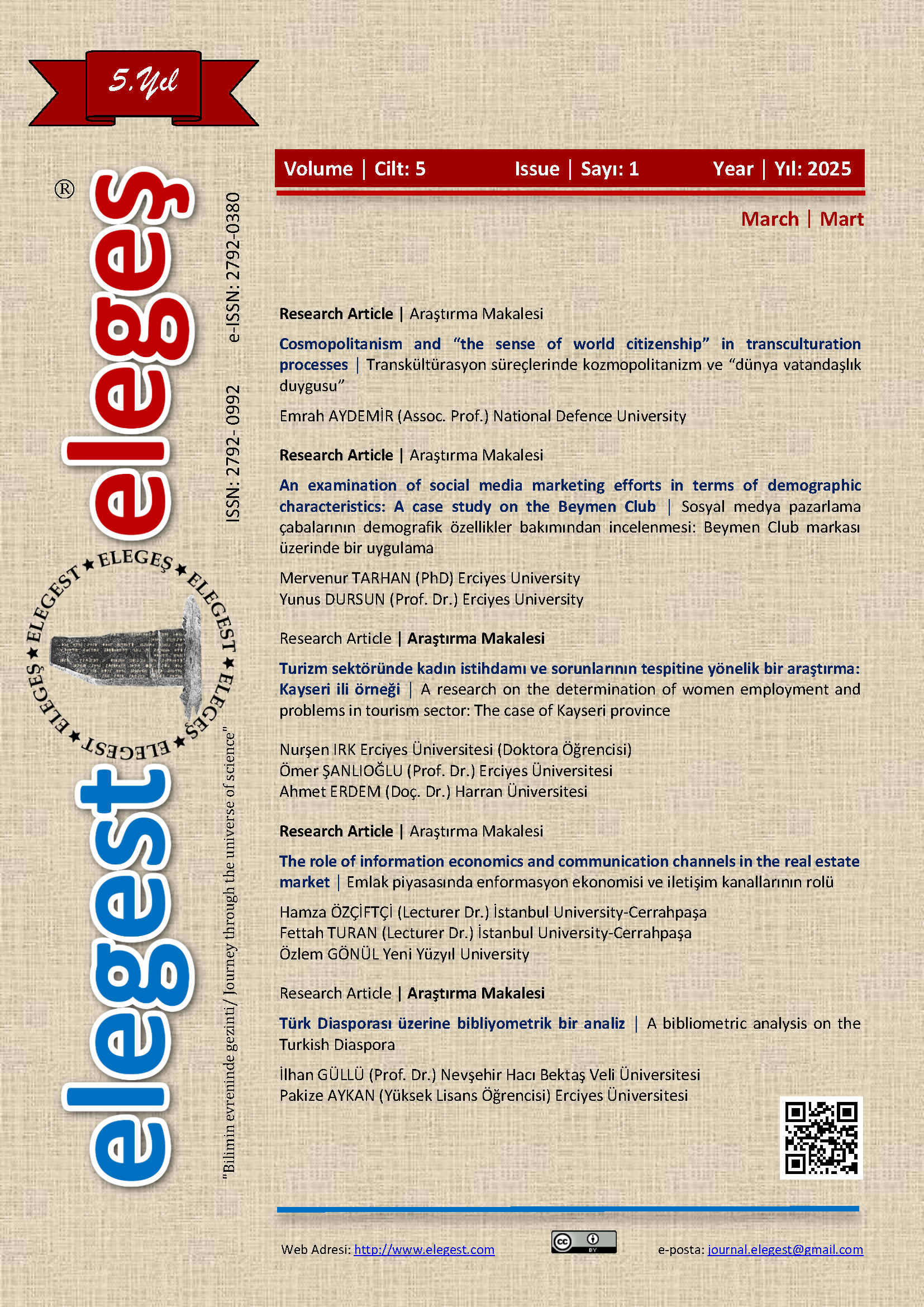
Published 31.03.2025
Keywords
- Transculturation,
- Transculturation Processes,
- Cosmopolitanism,
- The Sense of World Citizenship
- Transkültürasyon,
- Transkültürasyon Süreçleri,
- Kozmopolitanizm,
- Dünya Vatandaşlık Duygusu
How to Cite
Copyright (c) 2025 Emrah Aydemir (Yazar)

This work is licensed under a Creative Commons Attribution-NonCommercial-NoDerivatives 4.0 International License.
How to Cite
Abstract
Transculturation processes, which encompass cultural values, actions, works, rhetoric, cultural structures, cultural production, cultural change, cultural transformation, identity designation, and identity construction, constitute a paradigm that has shaped social reality within the universal spectrum of human experience, perception, and action. Within this paradigm, the dynamic processes of transculturation transcend regional boundaries, establish universal cultural formations through multilayered connections, facilitate the emergence of a universalist perspective on the world, and foster a profound understanding of how institutions, ideas, and socio-political networks should be interpreted. In this context, cosmopolitanism and the sense of world citizenship, which enable these processes to unfold both diachronically and synchronically under historical conditions, present a temporal framework in which every individual is regarded as significant. These concepts advocate for a shared perception of humanity centered on global peace and characterize relationships and connections on a global scale through universal principles. This article proposes a theoretical framework for examining the social and global imperatives inherent in transculturation processes and conceptualizes the role of cosmopolitanism and the sense of world citizenship in shaping global evolution within a comprehensive framework.
References
- Arnedo-Gómez, Miguel (2022). Fernando Ortiz’s transculturation: Applied anthropology, acculturation, and mestizaje, The Journal of Latin American and Caribbean Anthropology, 27 (1-2), pp.123-145.
- Arroyo, Jossiann (2016). Transculturation, syncretism, and hybridity. In Yolanda Martínez San Miguel, Ben Sifuentes-Jáuregui, Marisa Belausteguigoitia (Eds.). Critical terms in Caribbean and Latin American Thought: Historical and Institutional Trajectories, New York: Palgrave Macmillan, pp.133-144.
- Aydemir, Emrah (2024). Soft power in the concept of transculturation: Identity and universal identity. Legitimization and Non-Ethoncentric Image, 28 (78/73), 2, pp. 157-173.
- Balibar, Étienne (2018). Secularism and cosmopolitanism: Critical Hhypotheses on religion and politics, New York: Columbia University Press.
- Beck, Ulrich (2012). Global inequality and human rights: A cosmpolitan perspective. In Gerard Delanty (Ed.). Routledge Handbook of Cosmopolitanism Studies, Abingdon, Oxon: Routledge, pp. 302-315.
- Benhabib, Seyla (2006). Hospitality, sovereignty, and democratic iterations. In Seyla Benhabib and Robert Post (Eds.). Another Cosmpolitanism, New York: Oxford University Press, pp. 147- 186.
- Benhabib, Seyla (2006). The philosophical foundations of cosmopolitan norms. In Seyla Benhabib and Robert Post (Eds.). Another Cosmpolitanism, New York: Oxford University Press, pp. 13- 44.
- Cobb, Matthew A. (2022). Mediterranean goods in an Indian context: The use of transcultural theory for the study of the ancient Indian Ocean World. In Serena Autiero and Matthew A. Cobb (Eds.). Globalization and Transculturality From Antiquity to the Pre-Modern World, Abingdon, Oxon: Routledge, pp.165-182.
- Driessen, Henk (2013). Mediterranean divides and Cconnections: The role of dragomans as cultural brokers. In Sebastian Jobs and Gesa Mackenthun (Eds.). Agents of Transculturation: Bordor-crossers, Mediators, Go-betweens, Munster / New York / München / Berlin: Waxmann, pp. 25-38.
- Fine, Robert (2007). Cosmopolitanism, abingdon, oxon: Routledge.
- Harvey, David (2009). Cosmopolitanism and the geographies of freedom, New York: Columbira University Press.
- Hepp, Andreas (2015). Transcultural communication, Chichester West Sussex: John Wiley and Sons, Inc.
- Kirazoluğu, Oktay (2023). Proximity as a news value: A quantitative analysis of february 2023 Türkiye earthquakes news in international media, Gümüşhane Üniversitesi Sosyal Bilimler Dergisi, 15 (3), pp. 662-675.
- Leonard, Philip (2005). Nationality between poststructuralism and postcolonial theory, New York: Palgrave Macmillan.
- Linklater, Andrew (2012). The global civilizing role of cosmpolitanism. In Gerard Delanty (Ed.). Routledge Handbook of Cosmopolitanism Studies, Abingdon, Oxon: Routledge, pp. 60-71.
- Nye, Joseph S. (2005). Dünya siyasetinde başarmanın yolu: Yumuşak güç, Çev. Reyhan İnan Aydın, Ankara: Elips Kitap.
- Ortiz, Fernando (1947). Cuban counterpoint: tobacco and sugar, New York: Alfred A. Knopf, Inc. (1940 originally published in Spanish).
- Papastergiadis, Nikos (2012). Aesthetic cosmpolitanism. In Gerard Delanty (Ed.). Routledge Handbook of Cosmopolitanism Studies, Abingdon, Oxon: Routledge, pp. 220-232.
- Robbins, Bruce (2017). George Orwell, cosmopolitanism, and global justice. In Bruce Robbins and Paulo Lemos Horta (Eds.). Cosmopolitanisms, New York: New York University Press, pp. 40-58.
- Sayan, Şule (2024a). Ekoloji eksenli sanatsal pratikler: Suni doğa düşüncesi, The Turkish Online Journal of Design, Art and Communication, Vol 14 Issue 4, pp. 1039-1047.
- Sayan, Şule (2024b). Nesnenin politikası: teknik eksikliklerdeki saklı anlamlar, International Journal of Eurasia Social Sciences, Vol 15, Issue 57, pp. 1210-1222.
- Vemon, Richard (2012). Cosmoctizens?. In Gerard Delanty (Ed.). Routledge Handbook of Cosmopolitanism Studies, Abingdon, Oxon: Routledge, pp. 316-325.
- Waldron, Jeremy (2006). Cosmopolitan norms. In Seyla Benhabib and Robert Post (Eds.). Another Cosmpolitanism, New York: Oxford University Press, pp. 83- 101.
- Welsch, Wolfgang (1999). Transculturality – the puzzling form of cultures today. In Mike Featherstone and Scott Lash (Ed.) Spaces of Culture: City, Notion, World, London: Sage, pp.194-213.

